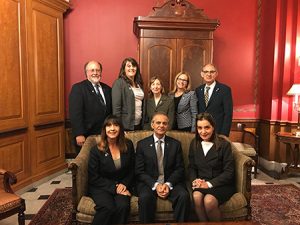On May 11, ACR leaders representing the Board of Directors, Affiliate Society Council, Government Affairs Committee (GAC), Committee on Rheumatologic Care, RheumPAC Committee and Insurance Subcommittee went to Capitol Hill to advocate on behalf of the ACR/ARHP membership and our patients. The group, which represents 27 states and the District of Columbia, conducted meetings in 101 offices of the Senate and House of Representatives, as well as Health and Human Services.
In advance of the meetings with government officials, the fly-in participants met together to plan strategy. Chap Sampson, MD, says, “Our GAC meeting centered on how to align the ACR’s priorities with the best ways we can create positive change in D.C. There is so much going on in Washington right now that it was difficult to only focus on a few particular issues, because everything seemed so important. I was proud that the ACR continues to chart a bipartisan course and is concentrating on the issues that directly affect our patients rather than the inherent conflicts of our current political climate.”
Dr. Sampson earned his medical degree and completed his residency at the University of Arkansas for the Medical Sciences. He completed a fellowship at Indiana University School of Medicine and practices at Washington Regional Rheumatology Clinic in Fayetteville, Ark.
AHCA
Regarding the American Health Care Act (AHCA), ACR leaders met with seven of the 13 members of the Senate who have been tasked with the current phase of healthcare reform and shared our policy priorities, centered on access to care, with those offices. You can read the ACR’s letter to the Senate stating these priorities here.
Dr. Sampson says, “The ACHA bill was still very new in everyone’s mind. I did my best to poll the congressional staff members we met with about where the Senate might head, and it sounds as though it will be a slower and more deliberative process compared with the House bill. However, no one would say much beyond that.”
What We’re Asking For
Padmapriya Sivaraman, MD, who participated in the fly-in, says, “As physicians we not only practice the art of treating the disease, but also the patient who has the disease. Being part of the rheumatology Political Action Committee gives us the unique opportunity to encourage this philosophy.” Dr. Sivaraman completed her residency and fellowship at Case Western Reserve University and practices at Rheumatology Associates in Dallas.

